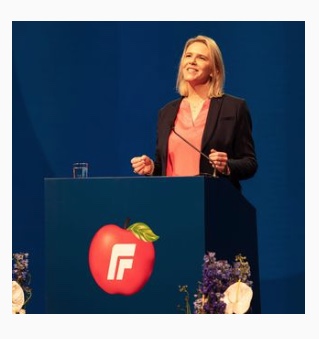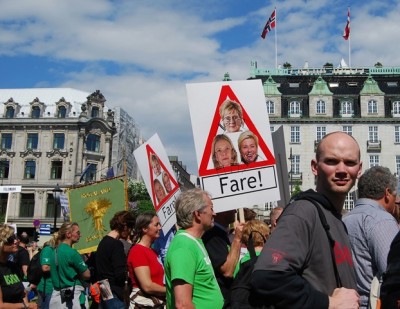NEWS ANALYSIS: Recent public opinion polls have shown voters fleeing the conservative Progress Party, especially in Norwegian cities. Sylvi Listhaug, formally elected as the party’s new leader over the weekend, faces a huge job in wooing them back as she tries to halt what can only be seen as Progress’ regression.

The most recent poll results published Monday were a “catastrophe” for the Progress Party, reported newspaper Dagsavisen. It showed Progress with only 4.7 percent of the vote in Oslo, down from 9.5 percent in the last Parliamentary election in 2017. That indicates voter support has been cut in half, according to the poll conducted by research firm Opinion for Dagsavisen and news services ANB and Frifagbevegelse.
Progress is also struggling in other Norwegian cities, now commanding only around 5 percent of the vote in Trondheim, Bergen and Kristiansand. In Stavanger and Tromsø, Progress (Fremskrittsparti, Frp) secured 8.9- and 8.6 percent respectively, according to newspaper Aftenposten, but that was also just half of what the party won during local elections in 2015. In the 1980s and well into the 2000s, when Progress was a strong voice for deregulation and lower taxes and fees, the party often won around 20 percent of the vote in Norway’s biggest cities.
“If Progress wants to grow again, they have to gain a foothold in the bigger cities,” election researcher Bernt Aardal told Aftenposten over the weekend. That won’t be easy, he said: “Urban residents generally have higher education and solid household economy. That’s not where we find most Progress Party voters.”
On a national basis, Progress now holds around 11 percent of the vote, according to another poll conducted by research firm Norstat for Aftenposten and state broadcaster NRK and released last week. That compares to the party’s election results in 2009 of 20.9 percent, when Listhaug’s predecessor Siv Jensen was firmly at the helm. Jensen later took Progress into government for the first time, in 2013, and served six years as finance minister in a coalition government with the Conservatives.
A need to stir things up again
Listhaug, always keen on provoking Progress’ “socialist” opponents on the left side of Norwegian politics, arguably contributed to her party’s regression during its waning years in government. Her habit of making nasty comments, usually uttered with a big smile, has offended many over the years, from asylum seekers and immigrants to climate activists and political opponents. She particularly offended the Labour Party and Parliament when, in 2018, she claimed on social media that Labour “cared more about terrorists’ rights than the nation’s security.” That ended up forcing her to apologize to Parliament and it cost Listhaug her job as justice minister.
Progress has a solid share of more moderate-minded economically conservative politicians like Jensen, willing to seek compromise, yet it was Listhaug whom Jensen tapped to make the party feisty again. Listhaug has generally been seen as representing the far-right wing of the party, and she immediately went on the attack in her first speech on Sunday as party leader. She attacked other parties’ climate policies, calling them both “extreme” and an example of a nanny state.

“There are strong forces that will gladly approve extreme measures as long as it’s in the name of the climate,” Listhaug said at her party’s annual national meeting, which was held digitalt so it was hard to detect real applause. She worried that the Corona crisis has paved the way for climate activists to take command.
“We must not be so naive,” she said, adding that “many politicians have had a taste of what it’s like to steer Norwegians’ everyday life.”
She insisted that the Progress Party is now unified and without the internal conflicts that marred it for years. She and Jensen recently “cleaned up” conflicts in both Bergen and Oslo, in what some view as a purge of nationalistic forces that could have been damaging for the party, even though Listhaug has been viewed as both nationalistic and populist herself.
In other voting at the party’s annual meeting this past weekend, the party approved a proposal to turn away asylum seekers at the border and send them to vaguely defined “third countries.” The party also wants to let bars and restaurants decide how long they can serve alcoholic drinks, once Corona restrictions are lifted. The party also voted to eliminate tax on personal net worth (called formueskatt, or fortune tax) and it continues to advocate lower taxes in general. The party also voted to oppose wind power projects on land unless local communities vote in favour of them in a referendum, it wants to lower the age for getting a driver’s license from 18 to 17 and double prison terms for those convicted of gang crimes.
In some surprising votes, the party also voted to retain economic incentives for electric cars and to distance itself from discrimination based on gender, religion or ethnic background.
Lost her taste for government
Listhaug has also made it clear that the party is unlikely to seek government power again any time soon. Getting the party into government had been a dream-come-true for former party leader Siv Jensen, a moderate who decided last fall she’d had enough of politics and would not seek re-election, either as party leader or a Member of Parliament. Listhaug, however, provocatively equated government service to being in prison when Progress left the government in January of last year.
Then came Corona, and Progress found itself stuck on the sidelines as the government it had been a part of took center stage in handling the crisis. Now Listhaug is dodging criticism against the government for failing to be better prepared for the crisis, since she’d been in charge of preparedness at the justice ministry.

Now Progress is trying to appeal to voters in rural districts and other outlying areas of Norway who oppose centralization and are always suspicious of political leadership from Oslo. After decades of fighting farm subsidies, not least during her term as agriculture minister from 2013 to 2015, Listhaug is now claiming she’d like to cooperate with the farmer friendly Center Party. It’s already hooked up with Labour, however, and has all reason, according to columnist Kjell Werner, to be might skeptical of Listhaug’s flirt. Voter may also remember that Progress favoured controversial mergers of police districts.
Veteran political commentator Arne Strand noted during the weekend that the leadership change at the Progress Party over the weekend was not dramatic. If anything, it’s significant that Siv Jensen was succeeded by another woman as leader of a party whose founder, Anders Lange, claimed in the 1970s that women had no place in politics. Jensen did manage to keep the party together and get into government. She’s also hailed for doing a good job as finance minister, remaining disciplined regarding use of oil revenues and steering the country through the oil price collapse of 2014. Jensen and Prime Minister Erna Solberg also seemed to get along reasonably well.
Listhaug will now go her own way, outside the confines of government. Strand thinks Listhaug will take Progress back to its “populist roots” and battle to lower immigration, taxes and fees. Times have changed, though, Strand cautioned. Those big issues for Progress in the past are not so important to voters today. “Sylvi Listhaug will struggle to win back voters,” Strand concluded.
newsinenglish.no/Nina Berglund

